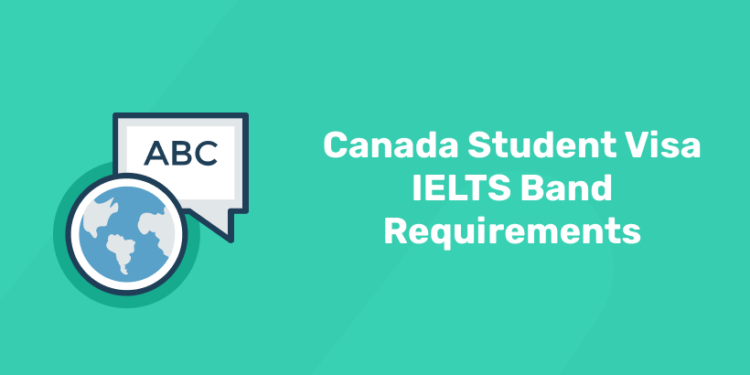Table of Contents
Achieve your study abroad aspirations in Canada. Unravel the IELTS band requirements that pave the way for an enriching academic journey.
The Canada Student Visa IELTS band requirements are language proficiency standards set by Canadian educational institutions. It is specifically for the international students applying for study programs in Canada. The International English Language Testing System (IELTS) is one of the commonly accepted language tests for this purpose. The band requirements can vary depending on the level of study and the institution you intend to attend. It is essential to check the specific language proficiency requirements of the Canadian educational institution you are applying to. As they may have different criteria for different programs. In this article we shall discuss Canada Student Visa IELTS Band Requirements. Explore the IELTS band score criteria for obtaining a student visa and pursuing your dreams of education abroad.
Canada Student Visa IELTS Band Requirements
The specific IELTS band requirement to get a Canadian Student Visa can vary depending on the level of study and the institution you plan to attend. Canadian educational institutions usually have their own language proficiency requirements. So it’s essential to check the specific requirements of the college or university you are applying to. As general guideline, many Canadian educational institutions require international students to meet the language proficiency requirement set by the institution.
For most undergraduate programs:
an overall IELTS band score of 6.0 to 6.5 with no band score lower than 5.5 to 6.0 is often required.
For postgraduate programs (master’s, doctoral, or research programs):
the IELTS band score requirement is usually higher, ranging from 6.5 to 7.5 overall, with no band score lower than 6.0 to 7.0.
It’s crucial to verify the specific language proficiency requirements of the Canadian educational institution you are applying to. As they may have different criteria for different programs and courses. Additionally, make sure to review the latest updates from the Canadian government regarding student visa requirements. As these regulations may change from time to time. It is advisable to check the official website of the Canadian institution. It will give you the most accurate and up-to-date information on the IELTS band requirements for your specific study program and student visa application.
achieve your desired band score ! get free demo video !
IELTS Requirements for Universities in Canada.
Given below are some universities in Canada with its IELTS band requirements:
| Sl.NO | Colleges and University | Listening | Reading | Writing | Speaking | Overall IELTS |
| 1 | Acadia University | – | – | – | – | 6.5 |
| 2 | Brandon University | – | – | – | – | 6.5 |
| 3 | Cape Breton University | 6 | 6 | 6 | 6 | 6.5 |
| 4 | Capilano University | – | – | – | – | 6.5 |
| 5 | Dalhousie University | – | – | – | – | 6.5 |
| 6 | Grant MacEwan University | – | – | – | – | 6.5 |
| 7 | McGill University | – | – | – | – | 6.5 |
| 8 | McMaster University | 5 | 5 | 5 | 5 | 6.5 |
| 9 | Memorial University | – | 6 | 6 | – | 6.5 |
| 10 | Mount Allison University | – | – | – | – | 6.5 |
| 11 | Mount Royal University | 5 | 5 | 5 | 5 | 6.5 |
| 12 | Nipissing University | 6 | 6 | 6 | 6 | 6 |
| 13 | Ontario College of Art and Design | 6 | 6 | 6 | 6 | 6.5 |
| 14 | Ryerson University | – | – | – | – | 6.5 |
| 15 | Simon Fraser University | – | – | – | – | 6.5 |
| 16 | St. Francis Xavier University | – | – | – | – | 6.5 |
| 17 | St. Mary’s University | 6 | 6 | 6 | 6 | 6.5 |
| 18 | St.Thomas University | – | – | – | – | 6.5 |
| 19 | Thompson Rivers University | 6 | 6 | 6 | 6 | 6.5 |
| 20 | Trent University | 6 | 6 | 6 | 6 | 6.5 |
| 21 | Trinity Western University | – | – | – | – | 6.5 |
| 22 | University of Alberta | 5 | 5 | 5 | 7.5 | 6.5 |
| 23 | University of British Columbia | 6 | 6 | 6 | 6 | 6.5 |
| 24 | University of Guelph | 6 | 6 | 6 | 6 | 6.5 |
| 25 | University of Lethbridge | 6 | 6 | 6 | 6 | 6 |
| 26 | University of Manitobae | – | – | – | – | 6.5 |
| 27 | University of New Brunswick | – | – | – | – | 6.5 |
| 28 | University of Northern British Columbia | 6 | 6 | 6 | 6 | 6.5 |
| 29 | University of Regina | 5 | 5 | 5 | 5 | 6.5 |
| 30 | University of the Fraser Valley | 6 | 6 | 6 | 6 | 6.5 |
| 31 | University of Toronto | 6 | 6 | 6 | 6 | 6.5 |
| 32 | University of Victoria | 6 | 6 | 6 | 6 | 6.5 |
| 33 | University of Windsor | – | – | – | – | 6.5 |
| 34 | University of Winnipeg | – | – | – | – | 6.5 |
| 35 | Vancouver Island University | 5.5 | 5.5 | 5.5 | 5.5 | 6 |
| 36 | Wilfrid Laurier University | – | – | – | – | 6.5 |
| 37 | York University | – | – | – | – | 6.5 |
| 38 | Athabasca University | 5 | 5 | 5 | 5 | 6.5 |
| 39 | Lakehead University | 6 | 6 | 6 | 6 | 6.5 |
| 40 | Laurentian University of Sudbury | – | – | – | – | 6.5 |
| 41 | University of Ottawa | – | – | – | – | 6.5 |
| 42 | University of Prince Edward Island | – | – | – | – | 6.5 |
| 43 | University of Western Ontario | 6 | 6 | 6 | 6 | 6.5 |
| 44 | Bishop’s University | – | – | – | – | 6.5 |
| 45 | Brescia University College | 6 | 6 | 6 | 6 | 6.5 |
| 46 | Canadian Mennonite University | – | – | – | – | 6.5 |
| 47 | Campion College | 5 | 5 | 5 | 5 | 6.5 |
| 48 | Algoma University | – | – | – | – | 6 |
| 49 | Concordia University College of Alberta | 5.5 | 5.5 | 5.5 | 5.5 | 6 |
| 50 | Emily Carr University of Art + Design | 6 | 6 | 6 | 6 | 6.5 |
| 51 | HEC Montréal | – | – | – | – | 6 |
| 52 | sHuron Univerity College | 6 | 6 | 6 | 6 | 6.5 |
| 53 | King’s University College at The University of Western Ontario | 6 | 6 | 6 | 6 | 6.5 |
| 54 | Kwantlen Polytechnic University | 6 | 6 | 6 | 6 | 6 |
| 55 | Laurentian University | – | – | – | – | 6.5 |
| 56 | Luther College | – | – | – | – | 6 |
| 57 | MacEwan University | 5.5 | 5.5 | 5.5 | 5.5 | 6.5 |
| 58 | NSCAD University | 6 | 6 | 6 | 6 | 6.5 |
| 59 | OCAD University | 6 | 6 | 6 | 6 | 6.5 |
| 60 | Redeemer University College | – | – | – | – | 6.5 |
| 61 | Royal Roads University | – | – | – | – | 5.5 |
| 62 | Saint Mary’s University | 6 | 6 | 6 | 6 | 6.5 |
| 63 | St. Thomas More College | – | – | – | – | 6.5 |
| 64 | The King’s University College | 6 | 6 | 6 | 6 | 6.5 |
| 65 | The University of British Columbia | 6 | 6 | 6 | 6 | 6.5 |
| 66 | University of Ontario Institute of Technology | 6 | 6 | 6 | 6 | 6.5 |
| 67 | University of St. Michael’s College | 6 | 6 | 6 | 6 | 6.5 |
| 68 | University of Sudbury | – | – | – | – | 6.5 |
| 69 | University of Trinity College | 6 | 6 | 6 | 6 | 6.5 |
| 70 | Victoria University | 6 | 6 | 6 | 6 | 6.5 |
| 71 | Camosun College | 5.5 | 5.5 | 5.5 | 5.5 | 6 |
| 72 | Canadian National Institute of Health | – | – | – | – | 0.6 |
| 73 | Canadore College of Applied Arts and Technology | 5.5 | 5.5 | 5.5 | 5.5 | 5.5 |
| 74 | College of New Caledonia | – | – | – | – | 6 |
| 75 | Confederation College of Applied Arts and Technology | – | – | – | – | 6 |
| 76 | Durham College of Applied Arts and Technology | 5.5 | 5.5 | 5.5 | 5.5 | 6 |
| 77 | George Brown College of Applied Arts and Technology | 6 | 6 | 6 | 6 | 6.5 |
| 78 | Georgian College of Applied Arts and Technology | – | – | – | – | 6.5 |
| 79 | Niagara College | 5 | 5 | 5 | 5 | 6 |
| 80 | Oxford College | – | – | – | – | 6 |
| 81 | Saskatchewan Institute of Applied Science and Technology | 5 | 5 | 5 | 5 | 6.5 |
| 82 | St. Clair College of Applied Arts and Technology | 5 | 5 | 5 | 5 | 5.5 |
| 83 | The Canadian Academy of Dental Health and Community Sciences | – | – | – | – | 6 |
| 84 | Charles Sturn University | 5.5 | 5.5 | 5.5 | 5.5 | 6 |
| 85 | Niagara University in Ontario | – | – | – | – | 6 |
| 86 | State University of New York : SUNY Potsdam | 5.5 | 5.5 | 5.5 | 5.5 | 6 |
It’s important to note that the IELTS requirements may vary among different faculties and departments within the same university. Some specialized programs or professional courses may have higher language proficiency requirements.
Top Canadian universities, such as the University of Toronto, McGill University, University of British Columbia, and others, have international admissions sections on their websites. You can find detailed information about their specific IELTS requirements, as well as any alternative English language proficiency tests they accept.
Remember to check the official university websites or contact their admissions office directly to verify the IELTS requirements and ensure that you meet the language proficiency criteria for the program you wish to apply to.
What is IELTS Band?
1: Most university students ........................ on campus in their first year.
The IELTS Band is a score or a numerical value that represents a candidate’s language proficiency level in IELTS. It is used to assess an individual’s ability to understand and use English in four key language skills: Listening, Reading, Writing, and Speaking.
The IELTS Band scale ranges from 0 to 9, with 0 being the lowest score and 9 being the highest. Each band corresponds to a specific level of English language proficiency:
- Band 9: Expert User – Fully operational command of the language.
- Band 8: Very Good User – Very effective command of the language with only occasional inaccuracies.
- Band 7: Good User – Effective command of the language, despite some inaccuracies and misunderstandings.
- Band 6: Competent User – Generally effective communication, but with some mistakes and misunderstandings.
- Band 5: Modest User – Partial command of the language, coping with overall meaning in most situations, though with frequent mistakes and misunderstandings.
- Band 4: Limited User – Basic competence, with frequent problems in understanding and expression.
- Band 3: Extremely Limited User – Conveying and understanding only general meaning in familiar situations.
- Band 2: Intermittent User – No real communication, except for the most basic information.
- Band 1: Non-User – Essentially no ability to use the language beyond a few isolated words.
- Band 0: Did not attempt the test – The candidate did not take the IELTS test.
The IELTS Band score is crucial for various purposes. They include applying for immigration, studying at an international university, or seeking employment in English-speaking countries. Different institutions or immigration authorities may have specific requirements for the minimum IELTS Band score they accept. So it’s essential to check the individual requirements of each organization or country.
Ace Your IELTS Exam with Confidence!
Unlock your potential with our expert-led IELTS preparation course. Achieve your dream score and open doors to global opportunities!
Start Your IELTS Journey Today!Why Study in Canada?
Studying in Canada offers numerous advantages and is a popular choice among international students. Here are some compelling reasons why studying in Canada is an excellent option:
High-Quality Education:
Canada is known for its world-class education system. Canadian universities and colleges maintain high academic standards, providing top-quality education and research opportunities.
Diverse Range of Programs:
Canadian institutions offer a wide variety of academic programs and courses, catering to different fields of study and interests.
Global Recognition:
A degree from a Canadian university is internationally recognized and respected, providing students with a competitive edge in the global job market.
Safe and Peaceful Environment:
Canada is considered one of the safest countries in the world. Its friendly and multicultural society welcomes students from all backgrounds, making it a welcoming environment for international students.
Affordable Education:
Tuition fees in Canada are relatively lower compared to other popular study destinations like the United States and the United Kingdom. Additionally, there are many scholarship and financial aid options available for international students.
Opportunities for Work Experience:
Canada offers various opportunities for students to gain work experience during and after their studies through co-op programs, internships, and post-graduation work permits.
Beautiful Landscape and Nature:
Canada’s scenic beauty, from majestic mountains to stunning coastlines and vibrant cities, provides a unique backdrop for students’ educational journey.
Multicultural Experience:
Studying in Canada allows students to experience a diverse and multicultural society, with people from all over the world living and studying together.
Quality of Life:
Canada consistently ranks high in various quality of life indexes, offering a high standard of living and excellent healthcare facilities.
Pathway to Permanent Residency:
Canada provides a pathway to permanent residency for international students through various immigration programs, making it an attractive option for those seeking to settle in the country after completing their studies.
Overall, Canada’s commitment to education, safety, and diversity, along with its breathtaking natural landscapes, makes it an ideal destination for international students seeking a rewarding and enriching educational experience.
get ielts training online ! join now !
How to obtain the Canadian Study Visa?
To obtain a study visa for Canada, you need to follow a step-by-step process. Here are the general steps you should take to apply for a Canadian study visa:
Obtain a Letter of Acceptance:
First, you need to apply and be accepted to a Designated Learning Institution (DLI) in Canada. Once you receive a Letter of Acceptance from the institution, you can proceed with the visa application.
Check Visa Eligibility:
Ensure you meet the eligibility criteria for a Canadian study visa, including sufficient funds to cover tuition fees, living expenses, and return transportation.
Gather Required Documents:
Prepare all the necessary documents, which may include your passport, Letter of Acceptance, proof of funds, language proficiency test scores (such as IELTS or TOEFL), and any other documents specified by the Canadian government.
Apply Online or through VAC:
You can apply for the study visa online through the Immigration, Refugees, and Citizenship Canada (IRCC) website or through a Visa Application Centre (VAC) in your country.
Pay Application Fees:
Pay the required visa application fees, which may vary depending on your nationality and the type of study program.
Biometrics Appointment:
In some cases, you may need to provide biometrics (fingerprints and photograph). If required, schedule and attend a biometrics appointment at a designated location.
Attend an Interview (if necessary):
In certain situations, you may be asked to attend an interview at your local Canadian consulate or embassy.
Wait for Visa Processing:
After submitting your application, you will have to wait for the visa processing time, which can vary based on your location and the time of year.
Receive the Visa Decision:
Once your application is processed, you will receive a decision on your study visa application. If approved, you will receive a Port of Entry (POE) Letter of Introduction.
Plan Your Arrival:
After obtaining the study visa, plan your travel to Canada, making sure to arrive before the program start date mentioned in your Letter of Acceptance.
Remember that the study visa process and requirements may change over time. So it’s essential to check official Immigration, Refugees, and Citizenship Canada (IRCC) website for the most up-to-date information and guidelines. It is also advisable to consult with the Canadian consulate or embassy in your country for any specific requirements or procedures related to the study visa application.
Ace Your IELTS Exam with Confidence!
Unlock your potential with our expert-led IELTS preparation course. Achieve your dream score and open doors to global opportunities!
Start Your IELTS Journey Today!Conclusion
The IELTS band requirements for a Canada student visa vary based on the educational institution and level of study. Generally, most universities and colleges require an overall IELTS band score of 6.0 to 6.5 for undergraduate programs. A score of 6.5 to 7.5 for postgraduate programs is expected. It is crucial for international students to meet the institution’s language proficiency requirements for admission and visa application. As the requirements may change over time, applicants should check the official websites of the educational institutions and Canadian immigration authorities for the most up-to-date information.
Canada Student Visa IELTS Band Requirements: FAQs?
1. What is the minimum IELTS band requirement for a Canada student visa?
Ans. The minimum IELTS band requirement for a Canada student visa varies depending on the educational institution and level of study. Generally, most institutions require an overall IELTS band score of 6.0 to 6.5 for undergraduate programs and 6.5 to 7.5 for postgraduate programs.
2. Can I use other English language proficiency tests for a Canada student visa?
Ans. Yes, in addition to IELTS, Canadian institutions may accept other English language proficiency tests such as TOEFL, Cambridge English exams, or Pearson Test of English (PTE). It’s essential to check with the specific institution to see which tests they accept.
3. Is it mandatory to take the IELTS Academic test for a Canada student visa?
Ans. While many educational institutions accept the IELTS Academic test, some may also accept the IELTS General Training test for certain programs. It is advisable to verify with the institution whether they require IELTS Academic or accept both versions.
4. Can I apply for a Canada student visa with a lower IELTS score than the institution’s requirement?
Ans. Meeting the institution’s IELTS band requirement is crucial for admission to a Canadian study program. If you have a lower score, the institution may not accept your application, and your study visa application may be rejected.
5. Are there any exemptions from the IELTS requirement for a Canada student visa?
Ans. Some applicants may be exempt from the IELTS requirement if they are from English-speaking countries, have previously studied in English-medium institutions, or have completed specific language programs. Check with the institution and Canadian immigration authorities for the specific exemption criteria.
6. Can I take the IELTS test after applying for a Canada student visa?
Ans. It is recommended to take the IELTS test before applying for a Canada student visa. Your IELTS score is essential for admission to the educational institution and for the study visa application process.
7. Can I retake the IELTS test if I do not meet the required band score?
Ans. Yes, you can retake the IELTS test to improve your score. Many candidates take the test multiple times to achieve the desired band score.
8. What is the validity period of the IELTS score for a Canada student visa application?
Ans. The validity of the IELTS score varies depending on the institution’s policy and the Canadian immigration regulations. Generally, IELTS scores are valid for two years from the date of the test.
9. Can I use an old IELTS score for a study visa if I have already studied in Canada before?
Ans. If you are applying for a new study program or have a gap between your previous study in Canada and your current application, you may be required to provide a valid IELTS score for the new study visa application.
| Related Links | |
| All About IELTS Exam | IELTS Reading Practice Test |
| IELTS Listening Practice Test | IELTS Writing Practice Test |
| IELTS Speaking Practice Test | Vocabulary in IELTS |










